Why Can’t One Last 1 Minute In Bed? Causes, Effects, And Complete Guide To Solutions
Introduction: Many men silently struggle with the issue of not being able to last long in bed. If you often finish within 60 seconds of penetration, you may be experiencing premature ejaculation (PE) — a common yet treatable sexual health concern. This problem isn’t just about physical endurance; it involves a combination of biological, psychological, and lifestyle factors. With platforms like Quickobook, you can book a test and consult sexual health experts from the comfort of your home to identify the root cause and start treatment quickly. This in-depth guide covers everything you need to know: from understanding the condition and its causes to treatment options, lifestyle changes, and expert tips. Understanding the Problem Premature ejaculation occurs when a man ejaculates sooner during sexual activity than he or his partner would like. While occasional early ejaculation is common, persistent cases that occur almost every time may need medical attention. Medical Definition: The International Society for Sexual Medicine (ISSM) defines PE as: Ejaculation that occurs within approximately 1 minute of vaginal penetration (lifelong PE) or a short time after (acquired PE). The inability to delay ejaculation on nearly all occasions. Negative personal consequences such as distress, frustration, or avoidance of intimacy. Key Statistics: Around 1 in 3 men will experience premature ejaculation at some point. In 20–30% of cases, ejaculation happens within the first minute of intercourse. It can occur in men of all ages, from late teens to older adults. Causes of Not Lasting 1 Minute in Bed Premature ejaculation can result from multiple factors that may act alone or together. Understanding these is the first step toward finding a solution. 1. Psychological Factors Performance Anxiety – Worrying about satisfying your partner can create a mental loop that triggers early release. Stress & Depression – Ongoing mental health issues can reduce control over sexual reflexes. Relationship Issues – Emotional distance or frequent conflicts can make you more tense during intimacy. Early Sexual Experiences – If you learned to reach orgasm quickly in your early sexual encounters, it may become a lasting habit. 2. Biological Causes Hormonal Imbalances – Low testosterone or serotonin levels can affect sexual stamina. Genetics – Some men naturally have higher sensitivity in the penile nerves. Prostate or Urethral Infections – Can increase nerve responsiveness. Nerve Disorders – Conditions like multiple sclerosis may affect sexual control. You can book a test via Quickobook to check your hormone levels, rule out infections, or get a nerve sensitivity assessment. 3. Lifestyle Factors Poor Fitness Levels – Low stamina and weak pelvic muscles can shorten endurance. Smoking & Alcohol – These can reduce blood circulation and nerve health. Excessive Porn Consumption – May create unrealistic arousal patterns. Lack of Sleep – Increases stress hormones and reduces sexual control. READ ALSO: Erectile Dysfunction: Causes, Symptoms, And Effective Treatment Options How It Affects Life and Relationships Premature ejaculation isn’t physically dangerous, but its emotional and social consequences can be significant: Self-Esteem Issues – Men may feel inadequate or ashamed. Relationship Strain – Partners may feel unsatisfied or emotionally disconnected. Avoidance of Intimacy – Fear of embarrassment can lead to less frequent sexual activity. Mental Health Decline – Frustration and low mood can worsen the problem. Addressing the issue early through a consultation — for example, by booking a specialist on Quickobook — can prevent these long-term effects. Getting Diagnosed If this issue has persisted for more than 3–6 months, it’s important to get evaluated. What to Expect in a Diagnosis Medical History Review – Your doctor will ask about your sexual experiences and general health. Physical Examination – To check for infections, hormonal imbalances, or other medical causes. Lab Tests – You can book test online for: Hormonal analysis STI screening Prostate health check Neurological evaluation Quickobook makes it easy to book these tests from home and get results quickly. Treatments and Solutions There’s no one-size-fits-all solution, but most men find improvement with a combination of methods. 1. Behavioral Techniques Start-Stop Method – Pause stimulation before climax, then resume after a brief rest. Squeeze Technique – Gently squeeze the penis head before climax to reduce arousal. Kegel Exercises – Strengthen pelvic floor muscles for better ejaculation control. 2. Medical Treatments Topical Anesthetics – Reduce penile sensitivity. Prescription Medications – Certain antidepressants delay ejaculation reflex. Hormone Therapy – For men with hormonal imbalances. Therapy & Counseling – Addresses psychological and relationship causes. 3. Lifestyle Adjustments Exercise regularly for stamina. Eat a nutrient-rich diet for better circulation. Reduce alcohol and quit smoking. Limit pornography to reset arousal patterns. Prevention and Long-Term Strategies Even after treatment, maintaining healthy sexual habits is essential: Keep stress levels low through meditation or yoga. Stay physically active. Maintain open communication with your partner. Schedule regular check-ups. You can book a test with Quickobook annually to monitor your sexual health. Expert Insights Quickobook’s partner specialists emphasize that early diagnosis is key. In most cases, PE is not permanent and can be managed effectively with the right combination of treatment, exercises, and mental health care. Frequently Asked Questions (FAQs) General Questions About Not Lasting 1 Minute in Bed What does it mean if I can’t last 1 minute in bed? It usually indicates premature ejaculation (PE), where ejaculation happens sooner than desired, often within 60 seconds of penetration. Is it normal to finish quickly during sex? Occasional quick ejaculation is normal, but frequent occurrences may require medical evaluation. Can premature ejaculation be permanent? For most men, it’s treatable with a combination of medical, psychological, and lifestyle interventions. How common is premature ejaculation? Around 20–30% of men experience it regularly, making it one of the most common male sexual issues. What’s the difference between premature ejaculation and erectile dysfunction? PE is about timing of ejaculation, while ED is the inability to achieve or maintain an erection. Causes and Risk Factors Can stress cause me to finish in less than a minute? Yes. Stress increases adrenaline, which can speed up ejaculation. Does age affect how long I last? Younger men may have less control, but PE can occur at any age. Can too much pornography cause early ejaculation? Overexposure can create unrealistic arousal patterns, leading to quicker climax. Do hormones play a role in PE? Yes. Low testosterone or serotonin levels can contribute. You can book a test through Quickobook to check your levels. Can a weak pelvic floor cause PE? Yes. Weak pelvic muscles reduce control over the ejaculation reflex. Diagnosis and Tests How do doctors diagnose premature ejaculation? Through medical history, physical exam, and sometimes lab tests. Can I diagnose myself at home? While you can track your timing, a medical evaluation ensures accurate diagnosis. Which tests help identify PE causes? Hormonal profile, prostate health check, STI screening — all available via Quickobook. Is an online consultation enough? Often yes, especially when combined with lab tests you can book online. Will the doctor ask about my sexual history? Yes, but it’s confidential and important for accurate treatment. Treatment Options Can PE be treated without medication? Yes, with behavioral techniques like start-stop and squeeze methods. Which medications help delay ejaculation? Certain antidepressants and topical anesthetics are commonly prescribed. Is counseling effective for PE? Yes, especially if anxiety or relationship issues are factors. Can hormone therapy help? Only if hormonal imbalance is confirmed via a book test. Will I need surgery? Surgery is rarely required for PE. Lifestyle and Self-Care Can exercise improve sexual stamina? Yes, especially pelvic floor and core-strengthening exercises. Does diet affect how long I last? Absolutely. A diet rich in zinc, magnesium, and antioxidants supports sexual health. Can quitting smoking improve my performance? Yes, as smoking damages blood vessels and nerves. Is alcohol good or bad for PE? While small amounts may reduce anxiety, alcohol often worsens control. Does getting enough sleep help? Yes. Poor sleep increases stress hormones that can lead to quicker ejaculation. Psychological Factors How does performance anxiety cause PE? Anxiety activates the fight-or-flight response, speeding up ejaculation. Can therapy alone cure PE? If psychological factors are the main cause, therapy can be highly effective. Is mindfulness useful for PE? Yes, it can help you stay in the moment and control arousal. Should I talk to my partner about it? Open communication can reduce pressure and improve intimacy. Does relationship stress worsen PE? Yes, tension in a relationship can increase anxiety and decrease control. Preventive Tips Can I prevent PE before it starts? Maintaining good sexual health, managing stress, and exercising regularly help. How often should I book a test for sexual health? At least once a year via Quickobook for early detection of problems. Are warm-up exercises before sex helpful? Yes, they can lower sensitivity before penetration. Can changing positions help? Yes, slower or less stimulating positions can help prolong intercourse. Does using a condom help delay ejaculation? Yes, condoms reduce sensitivity and can help you last longer. Myths vs. Facts Is PE a sign of low masculinity? No, it’s a medical condition unrelated to masculinity. Can only older men get PE? No, it can happen at any age. Is PE always caused by a medical problem? No, it can be psychological or lifestyle-related too. Do all men need medication for PE? No, many improve with non-medical methods. Is masturbation before sex a cure? It may help temporarily but isn’t a long-term solution Conclusion Not lasting one minute in bed can be frustrating, but it’s not the end of your sex life. By understanding the causes, getting tested, and following treatment plans, you can improve both performance and confidence. Quickobook makes it simple to book a test or consultation, ensuring you get professional help quickly. The sooner you act, the sooner you can enjoy a satisfying and healthy intimate life.
Read More
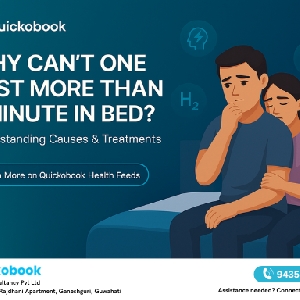
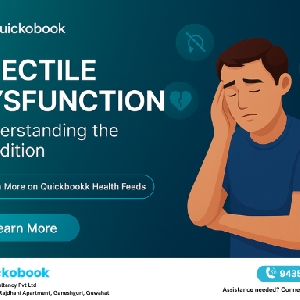
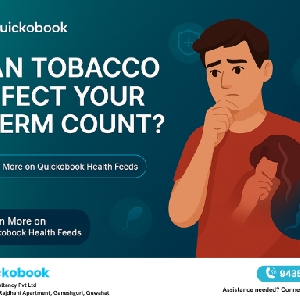
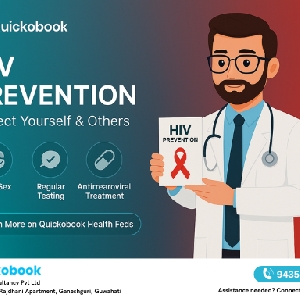

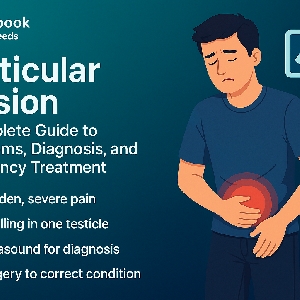

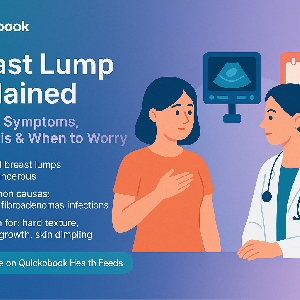
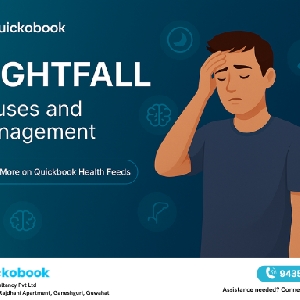
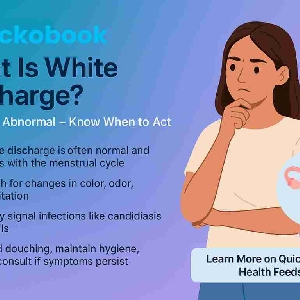

 Play Store
Play Store